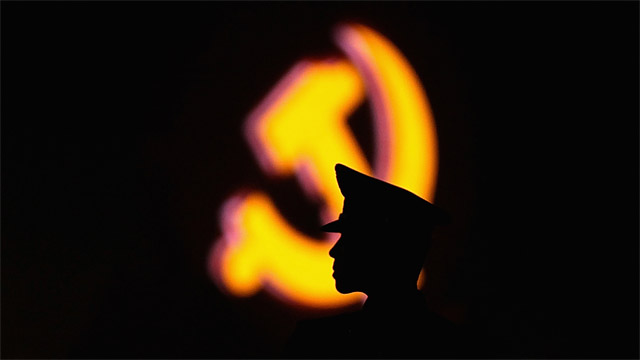
- Bloomberg reports: "The Sept. 10 front page of the Tianjin Daily portrayed Huang Xingguo, then leader of one of China's biggest ports, as the quintessential city official: Two stories extolled him receiving delegates from Taiwan's opposition party and telling a group of teachers about plans to improve their livelihoods. The state-run newspaper told a different story on Sept. 11. A banner headline announced the Communist Party's decision to investigate the acting Tianjin party secretary for "serious disciplinary violations," a euphemism for graft. The probe effectively ended Huang's four-decade political career, leaving a key space on the country's political chessboard vacant. Such sudden take-downs -- once rare events in China -- have come with increasing frequency as President Xi Jinping's anti-corruption campaign enters its fifth year. More than 1 million officials have been punished as of the end of last month, according to government statistics….The fear that anyone could be next has helped Xi keep the party off balance and sustain the crackdown into his all-but-certain second term….The Central Committee's plenum, which ends Thursday, is expected to help Xi institutionalize the anti-corruption drive with the adoption of two documents: a new code of conduct for party cadres and institutions, and an amendment of internal rules that will strengthen disciplinary bodies."
The Wall Street Journal reports: "In China's "war on pollution," five local officials stand accused of fighting back with cotton gauze. Investigators detained the five officials...after finding they had jammed the cotton gauze into air pollution monitors to make smog levels air appear cleaner than they really were...China's government has promised to clean up the environment and pledged greater transparency over air pollution. Cities across the country now update publicly available smog readings hourly. That puts local officials under increased pressure, particularly as they must also juggle the competing demand of sustaining economic growth....The environmental group Greenpeace said China is overall on a trajectory toward improved air quality, despite the alleged tampering by the five officials. Greenpeace says average levels of fine particulate matter known as PM2.5 fell 10% across 189 Chinese cities analyzed last year versus 2014....Xi'an isn't the only city falling under scrutiny. In April 2015, a vice minister of environmental protection, Wu Xiaoqing, said the government was embarking on a two-year crackdown on faking air-quality data."
Financial Times comments: "Chinese companies scouring the world to buy technology, brands and multinational corporations have sparked a significant trend this year. The scale is impressive….The acquisitions are generally welcomed by recipient countries…. Signs of resistance are mounting in the US, Australia and recently in Europe too. Nearly $40bn in planned Chinese deals have been scuppered since mid-2015, mostly because of tightened scrutiny over competition and national security concerns….Such repercussions were entirely predictable. The deal bonanza highlights stark asymmetries between China and the west, raising questions not only of corporate governance but also of whether there can be reciprocal treatment between a highly restrictive authoritarian state and open industrialised democracies….The plain fact is that western companies would stand little chance of securing Beijing's approval to buy an important state-owned Chinese corporation….Such a lack of balance is neither sustainable nor desirable. If China wants to continue to benefit from virtually free access to the best technology and brands the west has to offer, it needs to take reciprocity more seriously."
- 2016-10-25 Duterte Looks to Reassure Skeptical Japan Over China Ties
- 2016-10-24 China’s Digital Soft Power Play
- 2016-10-23 China's Xi Jinping Seeks Safety in Numbers—Or Else
- 2016-10-21 China’s plan to organize its society relies on ‘big data’ to rate everyone
- 2016-10-20 Rodrigo Duterte and Xi Jinping Agree to Reopen South China Sea Talks
- 2016-10-19 As China’s Economy Slows, a Look at What Could Happen
- 2016-10-18 Kenya: China petitioned to stop building railway in park
- 2016-10-17 China courts Philippines leader Duterte amid signs of US rift
- 2016-10-16 Philippine Leader Rodrigo Duterte Rolls Dice With Embrace of China
- 2016-10-14 Study: China's 2-Child Policy Won't Lead to Population Boom
- Bloomberg Xi's Agents of Fear Keep Party on Edge in Anti-Graft Fight
- The Wall Street Journal In China, Officials Battle Pollution (Data) with Cotton Gauze
- CNBC China consumer sentiment climbs to six-month high in October, survey shows
- Bloomberg Markets China's Banks Are Running Out of Ways to Keep Profits Growing
- The Wall Street Journal China's Tech Sector Is Underestimated, Venture Investors Say
- Reuters China to carry out more military drills in South China Sea
- Bloomberg Markets Tasmania to Get First Direct Flight to China (But Only for Milk)
- The New York Times Hong Kong Lawmakers Defy Oath Ban, Sparking More Unrest
- Bloomberg Technology Apple Slides in China as Homegrown Rivals Up Their Design Game
- The Wall Street Journal China Central Bank Seeks More Control Over Wealth-Management Products
- Bloomberg Markets China Early Indicators Show Mixed Bag for $11 Trillion Economy
- Reuters Philippines' Duterte tells Japan his China visit was just economics, blasts U.S.
- Human Rights Watch China: New Rules Gag Lawyers
- Financial Times Resistance to China's acquisition spree stiffens
- The Wall Street Journal China's Latest Debt Crackdown Just Delays More Serious Action
- Bloomberg Gadfly China Pain Is Hong Kong Property's Gain
- Quartz It's so dangerous being a bridesmaid in China that some brides are hiring professionals instead
- BloombergView China Can Resist a Crash But Can't Prevent One
- Financial Times Resistible rise: China's currency conundrum
- Quartz Long before he was elected president, Rodrigo Duterte let Beijing know the South China Sea was theirs
